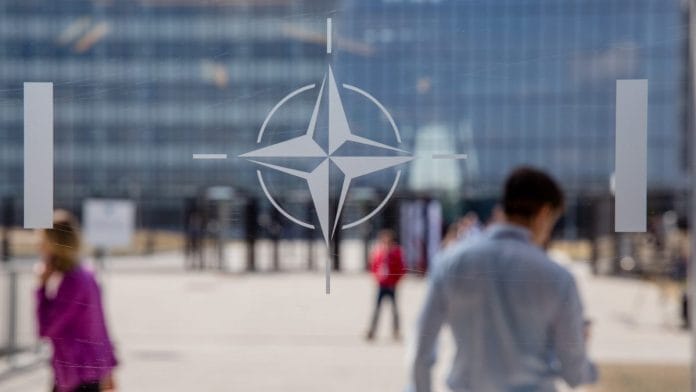Washington: The fight between the U.S. and Europe over Chinese technology is threatening to split the transatlantic military alliance, and tensions were ratcheted up another notch on Sunday by the U.S. ambassador to Germany.
Ambassador Richard Grenell tweeted that President Donald Trump had instructed him to “make clear that any nation who chooses to use an untrustworthy 5G vendor” risks jeopardizing intelligence and sharing with the U.S. “at the highest level.”
. @realDonaldTrump just called me from AF1 and instructed me to make clear that any nation who chooses to use an untrustworthy 5G vendor will jeopardize our ability to share Intelligence and information at the highest level.
— Richard Grenell (@RichardGrenell) February 16, 2020
The comment on Twitter seemed specifically aimed at Huawei Technologies Co., although Grenell didn’t mention the Chinese company by name. Grenell said Trump had delivered the order while aboard Air Force One, the presidential jet.
With the U.S. defense establishment identifying China as its No. 1 priority, a bi-partisan delegation headed by Secretary of State Michael Pompeo and House Speaker Nancy Pelosi rammed home their concerns about the use of equipment from Huawei at the Munich Security Conference over the weekend.
The officials warned that installing Huawei kit could undermine cooperation with U.S. allies as Trump’s hardball trade tactics started to infect his administration’s relationships on defense.
“Republicans and Democrats agree on this,” said Republican Senator Lindsey Graham of South Carolina, a close ally of Trump. “If you go down the Huawei road you are going to burn a lot of bridges.”
European leaders have been hunkering down amid the Huawei storm as they try to maintain their critical relations with both sides in the U.S.-China trade war. Pelosi’s intervention on Friday signaled that they shouldn’t pin their hopes on the problem blowing over if the Democrats win back the White House in December.
Structural Tensions
The atmosphere at the high-level gathering of security officials was an improvement on last year, when Vice President Mike Pence and German Chancellor Angela Merkel clashed. But the structural tensions between the U.S. and Europe were if anything greater: Europe’s exports to China have become a critical plank in its economic model and the Chinese have threatened retaliation on European companies if the bloc follows Trump in banning one of its flagship technology companies.
The U.S. was on the defensive throughout, because their strong-arm tactics have conspicuously failed to bring the Europeans into line: the EU stopped short of an outright ban on Huawei in its guidelines for 5G communication technology. Even the U.K., which has been energetically courting the White House as it begins life outside the EU, opted to use Huawei kit.
“We have a tech Cold War right now that’s on display right here and Europe wants no part in it,” said Ian Bremmer, president and founder of political risk consultancy Eurasia Group. “There’s never been such a rift with how Americans and Europeans define the security threat as right now.”
Also read: Trump is the least of NATO’s problems
That rift may have sweeping consequences as the western powers struggle to come to terms with the technological prowess China has developed since Xi Jinping in 2015 unveiled a 10-year plan to take the lead in industries like communications, I.T. and artificial intelligence. Huawei has become a lightning rod for the U.S.’s wider insecurities.
“If you don’t understand the threat and we don’t do something about it, at the end of the day, it could compromise what is the most successful military alliance in history: NATO,” Defense Secretary Mark Esper said in Munich.
Europeans are already feeling uneasy about the state of NATO.
Opening the conference in the Bavarian capital, German President Frank-Walter Steinmeier accused the Trump administration of rejecting “the very concept” of an international community. “Every country, it believes, should look after itself and put its own interests before all others,” he said.
French President Emmanuel Macron, who has said that NATO is undergoing “brain death,” said Saturday that Europe needs to build up its own capacity as a strategic power.
Since Trump took office, he’s tried to end the Iran nuclear deal, withdrawn from the Paris Climate Accord, and repeatedly threatened the EU with tariffs. So Pompeo’s claim that talk of the demise of the transatlantic relationship is “grossly over-exaggerated” was met with skepticism.
Hours later, U.S. Energy Secretary Dan Brouillette was crowing that U.S. sanctions have managed to scupper a $6 billion project to link Germany and Russia with a new Baltic gas pipeline, Nord Stream 2.
For Europe, caught between the U.S. and its global rivals, the situation may yet get worse.
While Trump often touts his relationship with Xi, competition between the countries has only deepened since they signed their “phase-one” trade deal last month. The U.S. a week ago charged members of China’s military over one of the biggest data thefts in American history and on Thursday charged Huawei with racketeering to engage in intellectual property theft.
And the coronavirus outbreak adds an extra element of uncertainty to the global political outlook — a disease originating in China is threatening to weaken the global economy in the run-up to a U.S. election.
“The potential for this to get much uglier in a short period of time is real,” said Bremmer. – Bloomberg
Also read: At 70, why NATO is tense and divided, grappling with deep political fissures






